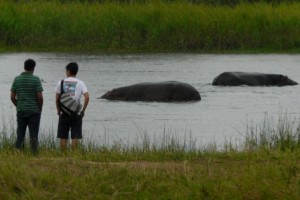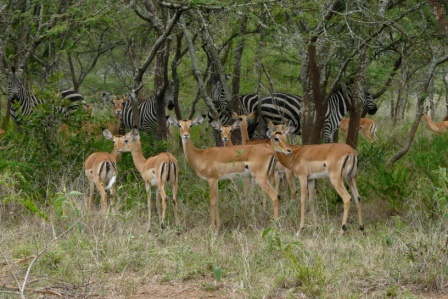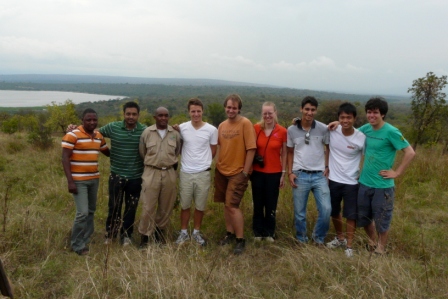No we are not talking about the browsing experience developed by a certain US company that can be dreadfully slow in Rwanda. Last weekend we experienced the ancient meaning behind safari. The word itself comes from the East African language Swahili and means, “to travel”. During the period of colonialism the word was adopted by Europeans to describe the act of travelling to watch wild animals. Rwanda is the perfect spot to do so with three national parks offering a wide variety of species in different climatic regions. The Volcano National Park in the North, known for its Gorillas, the jungle-like Nyungwe National Park in the South West, which neighbours Congo and Burundi, and the Akagera National Park savannah bordering Tanzania.
Although we are Imperial College students and thus drilled to work hard on our electrification project {;P} we also deserve some sweet relaxation time refuelling our souls with sunlight and procrastination. Due to the high price of the Volcano Park we decided to drive out to the cheaper Akagera Park on a sunny Saturday. We started our journey at 4am half asleep with a fearless driver, who seemed to accelerate in sharp, obscured turns and when pedestrians stood on the street. After two hours of fear and bumpy roads we arrived at the southern tip of the 70km long park. With six hours of muddy road ahead of us we let onboard our guide leaving us seven students squeezed in the jeep back designed for 5. The park ranger, by us deemed to be a wildlife expert due to his camouflage outfit and big binoculars hanging around his neck, introduced himself as a bird expert. With all respect, we were not here to spot tiny birds and learn the differences in their mating songs, but rather see the famous big five as the park ranger could suspect from the standard ignorant non-African visitor.
5 minutes in the park the driver suddenly stopped. A family of baboon monkeys blocked the street. Staring back at us they did not seem to fear the car and took their time to clear the road. Even to the extend that the alpha male had time to mate a couple of his female family members before departing into the steppe land with victorious posture. We continued our journey up north along the Akagera river and lakes. Our ranger pointed out that due to the dry weather conditions during the last days most of the animal herds moved to the north of the park. The early morning sun slowly disappeared behind light rain clouds that unfortunately brought us a quick shower just as we got our of the jeep next to a river bed. We were just able to see the last hippopotamus and their kids walk into the water. Although our guide told us that those massive creatures attacked people he reassured us that there was no danger getting closer to the river. While watching the hippos disappear below the water surface and materialize again with an air, water fountain of exhalation we discovered another specie just two meters away in the water from where we stood. Crocodiles were swimming across the water.

Sitting in the car again, we scared smaller herds of antelopes. Our guide explained to us the differences between impalas, bushbucks, waterbucks, and zebus. We also lived through a moment of Disney childhood nostalgia when we saw a “pumba” eating its way though the park. During the long ride we experienced periods of collective tiredness and mass paranoia. The paranoia was triggered by small flies with the ability to sting. At some point about five of those creatures kept us busy hitting wildly across the jeep and made us following our basic instincts when we felt a tickling sensation on our skin. The guys in the back used this as an opportunity for much hilarity by causing those in the middle row to jump from the simple action of a poke. From this moment on the driver and guide possibly categorized us as mad.
Arriving in the north of the park all cameras and smartphones were loaded, pointing in all possible directions to shoot whatever ran across our way. And like a paparazzi we experienced one hour non stop action: monkeys, warthogs, antelopes, zebras, hippos, giraffes, elephant faeces, buffalos, ‘muzungus’ (white people) sitting in other jeeps and a variety birds. One could have the impression that we were so busy catching every animal on digital memory that we forgot about recording our own ‘analogue’ image and emotion. … First world problems as we call them. As the park ranger has put it at the very beginning when we were eating cookies: “you are not here to feed your stomachs but your eyes with the sight of the animals”.
What an impressive experience for all us. Reminding us how important biodiversity is and environmental awareness. As a farewell present the birds above the park exit presented us with a rain fusillade of crap as we walked underneath. The secret revenge of the bird expert to withhold the knowledge of this common attack, as the white spotted ground showed. {J}.
Lukas Lukoscheck

